Entrepreneurs and business leaders frequently research different tactics to increase productivity, boost employee morale, and foster a positive work environment in their quest for business success.
While modern offices and cutting-edge technology have their place, one underrated but potent component is nature.
Those leafy, green housemates frequently residing in our homes can be extremely important in business.
This blog will examine how strategically placing plants in your office space can help you run a thriving, prosperous business.
Find out how to use nature’s power for business success, from increasing productivity to fostering a positive environment.
10 Plants for Business Success
Having houseplants is a fantastic way to channel the natural flow of positive energy. Lucky houseplants purify the air by absorbing carbon dioxide and alleviating stress.
Positive houseplants clear stagnant and stale energy. They give us positive feelings by making us think of green, which is advantageous. According to Vastu Shastra, placing healthy plants and plants that attract money and good fortune in the appropriate locations makes it simpler to achieve your goals and enhances relationships.
We will be talking about the Eastern idealogy, scientific reasons, correct placement and care instructions for these top 10 plants:
- Rubber plant (Ficus elastica)
- Peace lily (Spathiphyllum)
- Moth orchid (Phalaenopsis)
- Snake plant (Sansevieria)
- Pothos (Epipremnum aureum)
- Jade plant (Crassula ovata)
- Money tree (Pachira aquatica)
- Lucky bamboo (Dracaena sanderiana)
- Rosemary plant (Salvia rosmarinus)
- Areca palm (Dypsis lutescens)
1. Rubber plant (Ficus elastica)
Rubber plants are hardy, with glossy, dark green leaves that can grow up to 10 feet tall indoors.
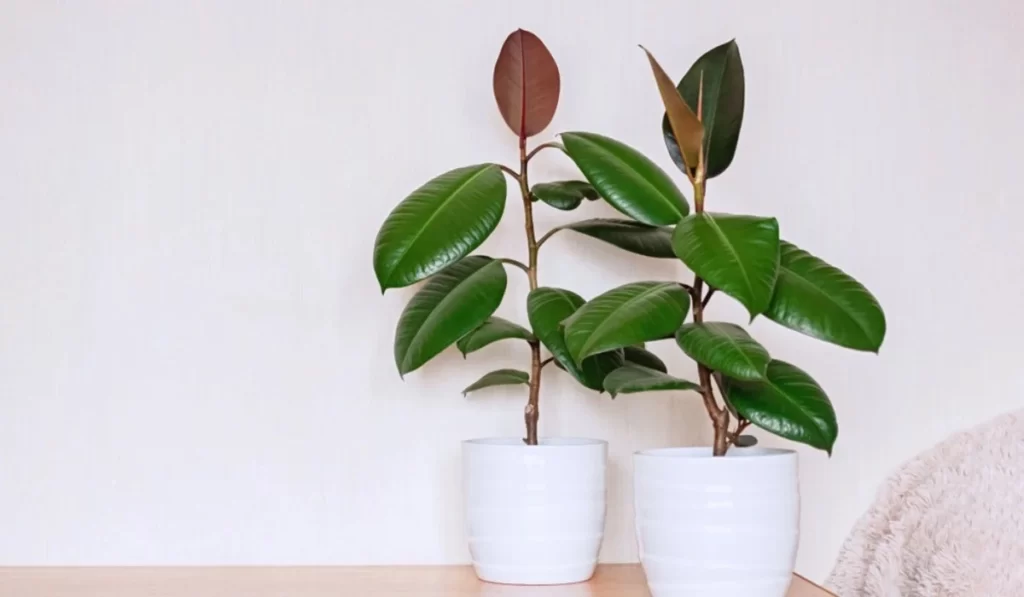
🧿 Feng Shui/Vāstu-Śhastra
It is said to draw good luck, wealth and prosperity in feng shui.
People think that rubber plants bring money and good fortune. People often choose these plants for their offices because their lush green leaves give off an air of wealth.
⚛️ Scientific rationale
This plant can get rid of harmful pollutants and toxins. So, making your house look nice and cleaning the air are good ideas to help you feel better about yourself.
🫶 Care
At least six to eight hours of light are required each day for the rubber tree. It is best to provide this species with medium to bright light, preferably bright indirect. This can occasionally be lower light.
📍 Placement
If your windows are exposed to glaring direct sunlight, a sheer curtain over the windows can help diffuse the light.
The color of the Rubber Tree’s leaves will start to fade if it doesn’t get enough light, which you can tell by how it behaves. Putting them in the southwest direction is a good idea.
2. Peace lily (Spathiphyllum)
Peace lily is a beautiful plant with white, spath-like flowers and dark green leaves that can purify the air and remove toxins. It is believed to create a peaceful and harmonious environment for business.
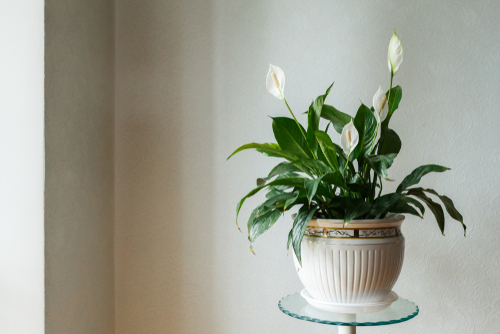
🧿 Feng Shui/Vāstu-Śhastra
Peace lilies are known for their big and beautiful lucky flowers. This plant is also called a “lucky plant,” which means that people think it will bring them luck and even keep away evil spirits.
This plant is excellent for offices with a lot going on because it doesn’t need much care. Peace lilies are considered to have feng shui benefits by denoting harmony, peace, and prosperity in the workplace or home. They also promote positive energy and help to purify the mind to enhance productivity.
⚛️ Scientific rationale
It can remove toxins from the air, such as formaldehyde, benzene, and carbon monoxide, which can improve the health and well-being of the occupants.
It helps to absorb the harmful acetone vapors and control their presence in the surrounding air. It can also manage indoor humidity levels by releasing moisture through transpiration, preventing dryness and irritation of the skin, eyes, and throat.
🫶 Care
Peace lilies are easier to care for than other plants. They only need indirect light and moderate watering. They can also indicate when they need water by dropping their leaves.
📍 Placement
This makes it an excellent choice for offices that don’t have much time to keep their space clean. Putting a peace lily in a quiet corner where people with busy schedules can enjoy its cheerful and welcoming nature may be helpful in a busy office.
3. Moth orchid (Phalaenopsis)
It is a delicate plant with long-lasting, colorful flowers that can bloom several times a year. In feng shui, it is thought to symbolize elegance, beauty and abundance.
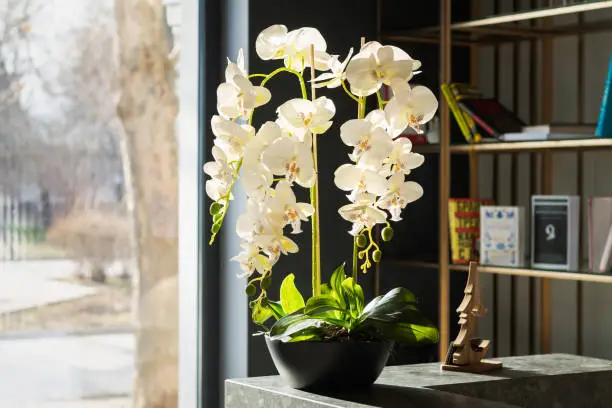
🧿 Feng Shui/Vāstu-Śhastra
Moth orchids are considered symbols of love, beauty, elegance, and perfection. In some traditions, they are also associated with fertility, virility, and sexuality, as they can produce many flowers and seeds.
Moth orchids are believed to have medicinal and healing properties in some eastern systems, such as Ayurveda and Traditional Chinese Medicine.
They can treat various ailments, such as coughs, fevers, skin problems, and infections.
⚛️ Scientific rationale
Moth orchids can improve concentration and productivity by creating a more pleasant and stimulating work environment. They can also enhance memory retention and cognitive performance.
Moth orchids can purify the air by absorbing harmful pollutants like formaldehyde, xylene, and toluene. They can also release oxygen at night, which can improve the quality of sleep and reduce stress.
📍 Placement
Orchids come in different sizes, so you can put them in your office, whether big or small.
Large, showy orchids can be put in common areas like conference rooms, reception, and waiting rooms to fill up space.
More miniature orchids can be placed on employees’ desks to brighten their workspaces.
Because of this, they are one of the best office plants for pots.
🫶 Care
Giving your orchid plenty of humidity, light, and warm temperatures will grow beautiful flowers.
4. Snake plant (Sansevieria)
The snake plant is a low-maintenance plant with stiff, upright leaves that can tolerate low light and drought.
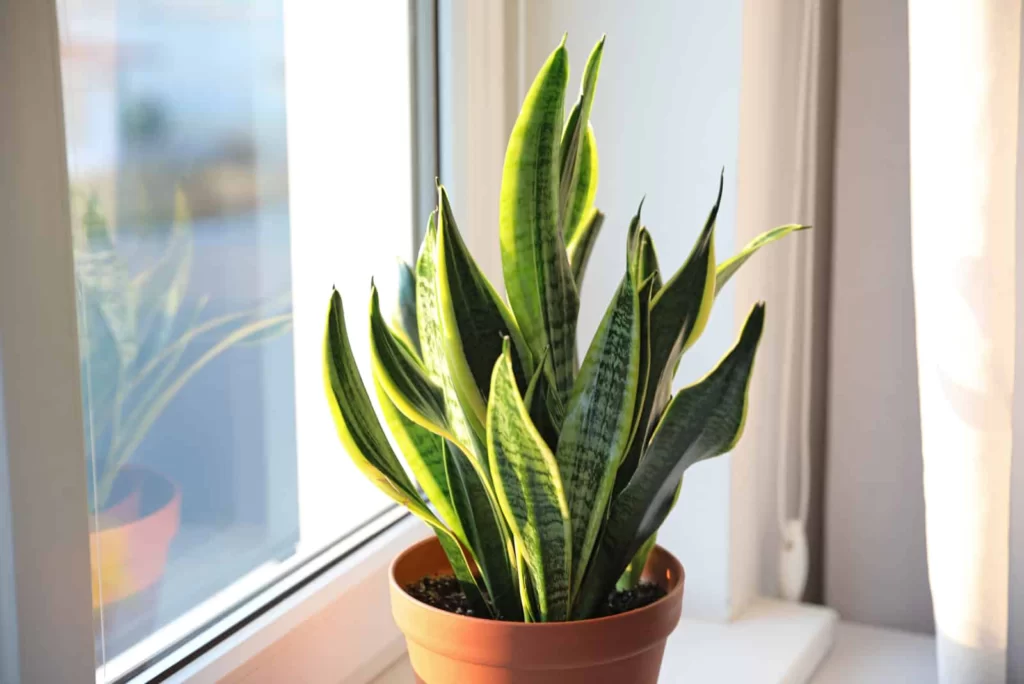
🧿 Feng Shui/Vāstu-Śhastra
It is known to improve the energy flow and remove negative vibes in the workplace.
Snake plants are on all lists of office plants that are good for Vastu. These plants are almost impossible to kill and can grow anywhere.
Vastu Shastra says that the snake plant is a center of good energy and one of the best air-cleaning plants. It gets rid of pollutants in the air and calms you down, making it the best choice for the office.
⚛️ Scientific rationale
They can purify the air by removing harmful toxins and releasing oxygen. They can boost productivity and concentration by increasing brain oxygenation and reducing stress and anxiety.
📍 Placement
You should place the snake plant in a location with indirect light, such as near a window with sheer curtains or under a shade outdoors.
🫶 Care
- Avoid direct sun exposure, as it can scorch or burn the leaves.
- Use a well-drained pot and free-draining soil to prevent waterlogging and rotting of the roots.
- A terracotta pot is preferable, as it allows excess moisture to evaporate.
- Water the snake plant lightly and infrequently, only when the soil is dry.
- Do not overwater, as it can cause root rot and fungal infections.
5. Pothos (Epipremnum aureum)
Pothos is one trailing plant with heart-shaped leaves that can grow in water or soil.
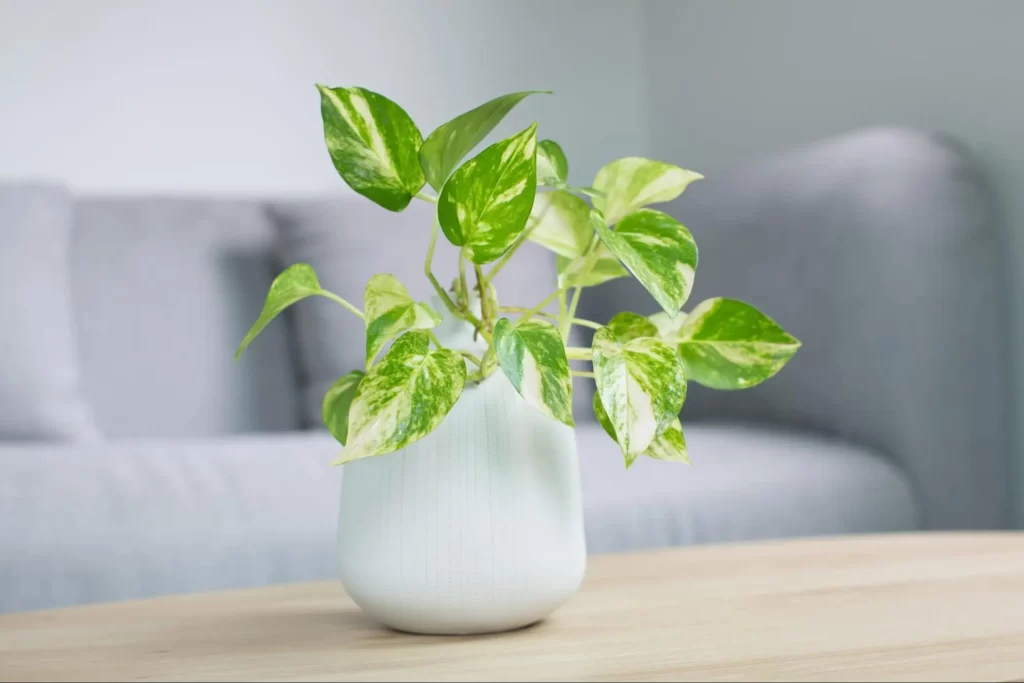
🧿 Feng Shui/Vāstu-Śhastra
It is associated with good fortune, happiness and success in feng shui.
According to some regions and Feng Shui principles, it brings good luck and financial prosperity. It can also rid your home of negative or stagnant energy.
This is associated with the Greek god of longing, Pothos, who represents yearning or desire, particularly when alone. Due to its vigorous growth habits, it is symbolic of determination and eternal life.
⚛️ Scientific rationale
Pothos (Epipremnum aureum) is a hardy indoor foliage plant with many benefits. It can purify the air by absorbing harmful toxins such as formaldehyde, benzene, and carbon monoxide.
It can reduce stress levels and boost mood by providing a sense of nature and greenery, enhancing productivity and creativity.
This plant helps increase humidity levels in the air by releasing water vapor through its leaves, preventing dry skin, sore throat, and respiratory problems.
🫶 Care
It is simple to grow and spread this low-maintenance indoor plant. Simple essential maintenance is required for a pothos. These plants do well in many different environments.
They can grow in dry soil or containers filled with water, and they do well in both dim and intense indirect light.
📍 Placement
Pothos plants are a great addition to your office because they can flourish in low-light environments.
Although they struggle in direct sunlight behind glass, pothos thrive in various lighting conditions.
6. Jade plant (Crassula ovata)
Crassula ovate, also known as the jade plant, lucky plant, money plant, or money tree, is a succulent plant with tiny pink or white flowers Indigenous to South Africa. It is widely grown as a houseplant all over the world.
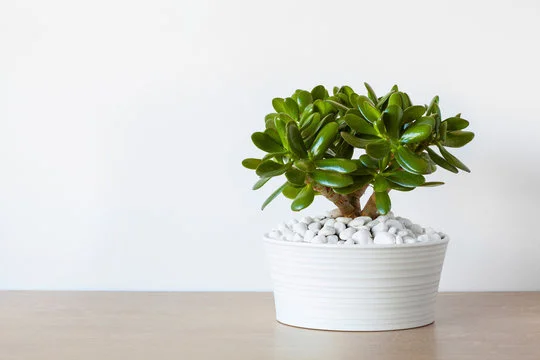
🧿 Feng Shui/Vāstu-Śhastra
It is said that having a Jade Plant in your home will bring you luck and money. Office Vastu is thought to be a powerful way to attract good energy and money. Jade is also known as a money plant, money tree, or lucky plant.
Vastu Shastra says it can also ward off evil and hostile eyes.
Due to its resilience and long lifespan, it is symbolic of friendship, loyalty, and longevity. It is also associated with the jade stone, a precious gem in many cultures.
⚛️ Scientific rationale
It can improve indoor air quality by absorbing carbon dioxide at night and removing volatile organic compounds (VOC) from the air, which can reduce respiratory problems and allergies.
It can reduce stress levels and boost mood by providing a sense of nature and greenery, enhancing your productivity and creativity.
🫶 Care
The plant is easy to care for and does well in various light levels, making it an excellent choice for an office.
Inspect the soil you choose for drainage before using it. If your jade plant keeps too much water, it can lead to problems with fungi.
📍 Placement
Putting a jade plant in a bright, sunny window can also help you feel better and have more energy.
7. Money tree (Pachira aquatica)
Money tree tropical plant with braided stems and glossy, palmate leaves. It is sold commercially as the Money tree and Money plant and goes by Malabar chestnut, French peanut, Guiana chestnut, Provision tree, Saba nut, Monguba (Brazil), and Pumpo (Guatemala).

🧿 Feng Shui/Vāstu-Śhastra
Vastu also says that the money plant brings good energy, luck, wealth, and prosperity, making it a better indoor plant choice. It can be kept at home or the office.
Vastu Shastra says that keeping lucky plants at home will bring prosperity to the home and get rid of money problems. The heart-shaped leaves of the money plant are also thought to bring long-lasting friendship.
It helps keep your home peaceful and healthy, which prevents problems and tensions in your marriage and provides a good environment.
It also helps eliminate bad luck for the people who live in the house. This gives you good luck, money, and a lot of power.
⚛️ Scientific rationale
You’ll be happy to know that the money plant is a succulent that absorbs the heat that computers, laptops, and cell phones give off in your home or office.
📍 Placement
According to Vastu and Feng Shui, money plants should be kept indoors in the southeast corner of the living room or hall.
According to Indian mythology, Lord Ganesha is in charge of the Southeast direction, and Venus is the planet that rules it.
8. Lucky bamboo (Dracaena sanderiana)
A low-maintenance plant with slender, green stalks that can be arranged in various shapes. It is thought to represent the five elements of feng shui and enhance positive energy.
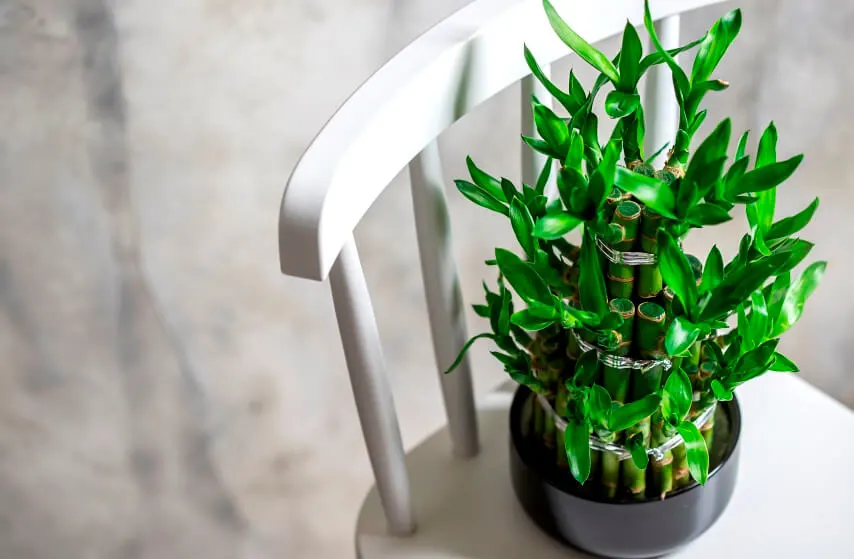
🧿 Feng Shui/Vāstu-Śhastra
The bamboo plant is also thought to bring good luck, making it a great choice to attract money, love, and a long life.
⚛️ Scientific rationale
The plant makes the office more open and airy, lowering stress and anxiety. The ability of a Lucky Bamboo plant to purify the air is a tremendous benefit of using bamboo plants indoors.
📍 Placement & 🫶 Care
Bamboo can grow quickly, but it needs a little care to stay healthy. This plant grows quickly and is a tremendous lucky plant for office desks. It’s perfect for a busy office where work stresses people out.
9. Rosemary plant (Salvia rosmarinus)
Rosemary (Rosmarinus officinalis) is a woody, fragrant herb with a 15-20 year lifespan. Rosemary has leathery, fragrant leaves that resemble pine needles and white, purple, or blue flowers.
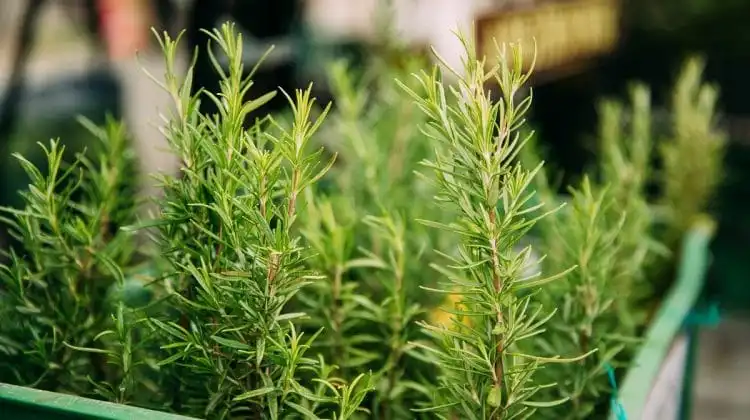
🧿 Feng Shui/Vāstu-Śhastra
Rosemary is an excellent protection plant that can keep bad things away from your workspace. The plant has pretty purple flowers and is often used to protect homes.
⚛️ Scientific rationale
It is also known for having many antioxidants, which can help prevent many diseases. The plant is a great way to decorate your office.
It adds some greenery and freshness, which makes it one of the best Vastu plants for office.
🫶 Care
Although rosemary is native to warm Mediterranean regions, it thrives in colder climates. A cutting that has been potted up and kept in a protected location will protect your plant from dying entirely over the winter in areas that experience heavy frost.
The best-growing conditions for rosemary are dryness, well-drained soil, and sunlight.
10. Areca palm (Dypsis lutescens)
A graceful palm with feathery fronds that can grow up to 7 feet tall indoors. Areca Palm, also called the yellow palm, is a popular houseplant for many reasons.
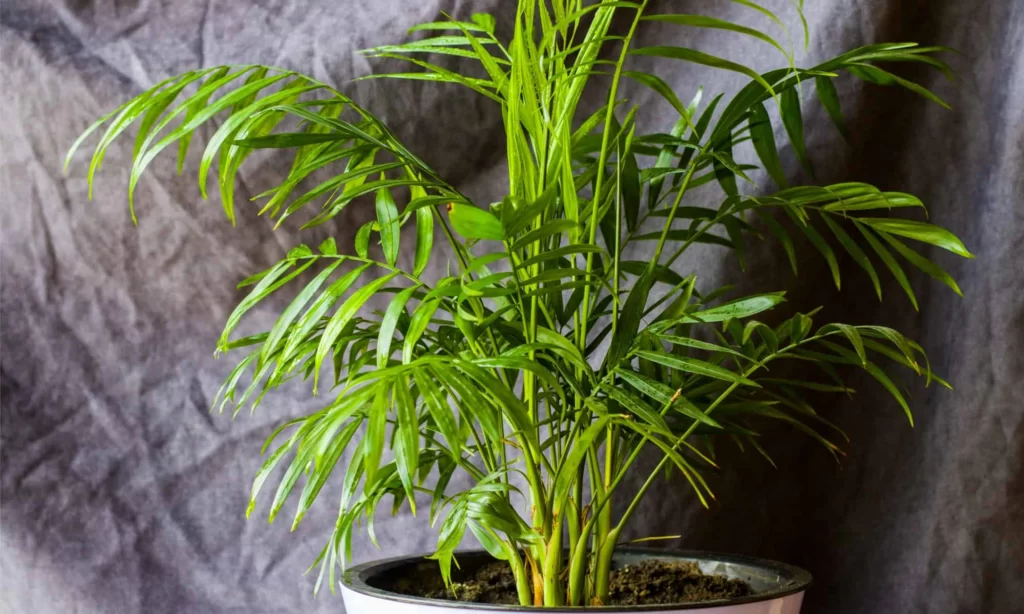
🧿 Feng Shui/Vāstu-Śhastra
It is known to purify the air and create a harmonious atmosphere.
One of its benefits is that it can help improve the Vastu plants for the office. You can bring happiness and energy to your workplace, making you more productive and opening up new opportunities.
⚛️ Scientific rationale
Areca Palms help eliminate dangerous air pollutants and improve the air.
📍 Placement & 🫶 Care
It can be helpful in an office, where people spend a lot of time and need clean air. The plant is also easy to care for and can grow in various lighting conditions, making it an excellent office choice.
Principles of feng shui
The five-element system, derived from Taoist philosophy, is used in feng shui and examines how the natural cycles interact to maintain balance. The five basic elements are earth, metal, water, wood, and fire. Each element has a set of characteristics, colors, and shapes that can be used as design elements to emphasize those characteristics in your home and daily life.
- Earth
Earth is associated with nourishment, boundaries, and self-care. It is associated with earthy hues like yellow, orange, and brown, heavy objects, and square shapes. You can add the earth element to your home with a solid rectangular desk or a square, yellow rug.
- Metal
Metal possesses the virtues of joy, beauty, and accuracy. Metal is symbolized by the colors white, gray, and metallic, as well as by circular forms. Add a round metal planter or light fixture to your space to add metal.
- Water
Water symbolizes deep knowledge and a link to other people and the world. It has to do with dark blue, black, and wavy shapes. You can bring water into your home with a fountain or pictures of water.
- Wood
Wood is connected to life, growth, and healing. It is shown in tall, columnar green, blue, and teal shapes. Green houseplants are a great way to bring wood into your home, especially if you need more space.
- Fire
Fire is a symbol of passion, inspiration, and being seen. It involves fiery colors and shapes, like red and bright orange. Light also has something to do with fire. A great way to bring fire into your home is with lamps.
Top 5 plants to avoid in your office
You might not want to have a lot of plants in your house for various reasons, such as Vastu, allergies, and so on. Some examples of these plants are:
1. Bonsai (Ulmus parvifolia)
Vastu says these small trees are artistic, but they are not lucky and will bring bad luck. They are also hard to take care of and need special care.
Regarding Vastu, having a bonsai plant in your home is not a good idea. Avoiding placing this plant in your home is best.
It represents slow or stunted growth and may interfere with the inhabitants’ life cycle.
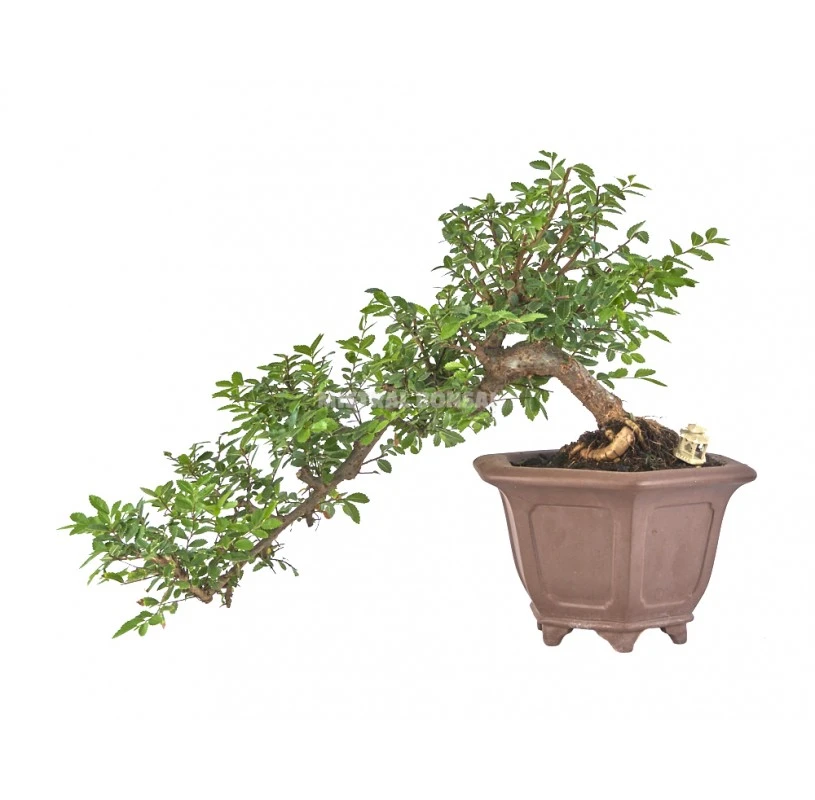
2. Cotton Plant (Gossypium herbaceum)
Cotton is not one of the many large plants that can be grown at home. Silky cotton plants are regarded as unlucky houseplants.
Although these snowy white plants make a lovely decorative addition, according to Vastu, they are not the best choice because they are unlucky and bring bad luck when placed indoors.

3. Tamarind Tree (Tamarindus indica)
According to Vastu, this tropical tree hinders family growth and leads to financial difficulties. Additionally, it is enormous and unsuitable for cultivation indoors.
Tamarind can send unfavorable energies and vibes to the home. Because evil spirits are believed to reside in tamarind trees, caution should be taken when approaching or bringing it home.
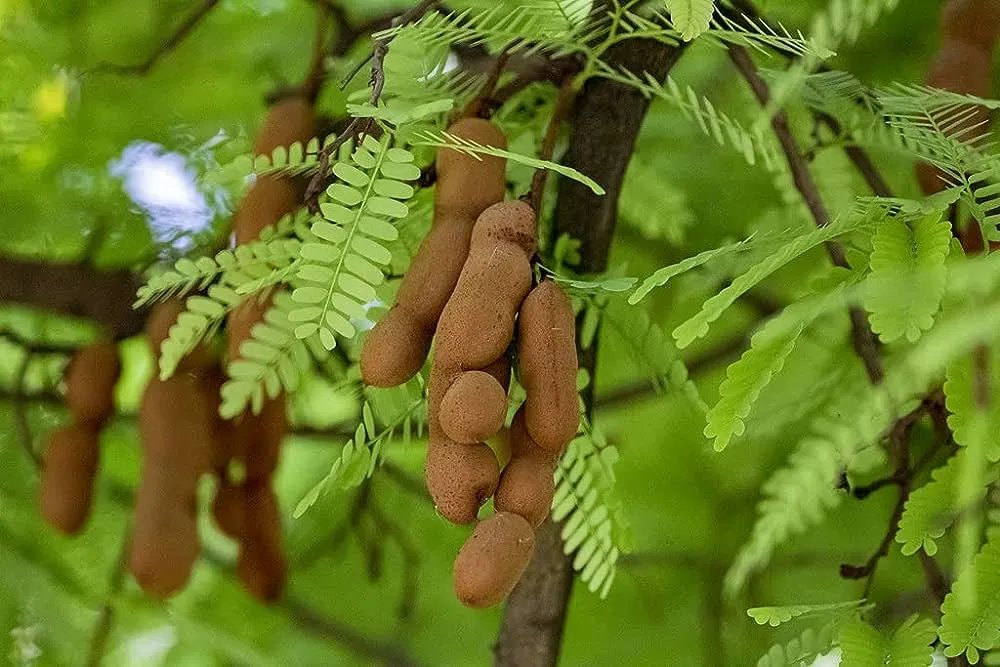
4. Lily of the Valley (Convallaria majalis)
Although it has a sweet scent, this delicate flower is poisonous to humans and animals. It may result in symptoms like an erratic heartbeat, fuzzy vision, confusion, and even death.
There are many different types of toxins in the plant, but the ones that affect the heart and GI tract are saponins and cardiac glycosides, primarily convallarin and convallamarin.
The entire plant is poisonous, including leaves, berries, stems, and roots.
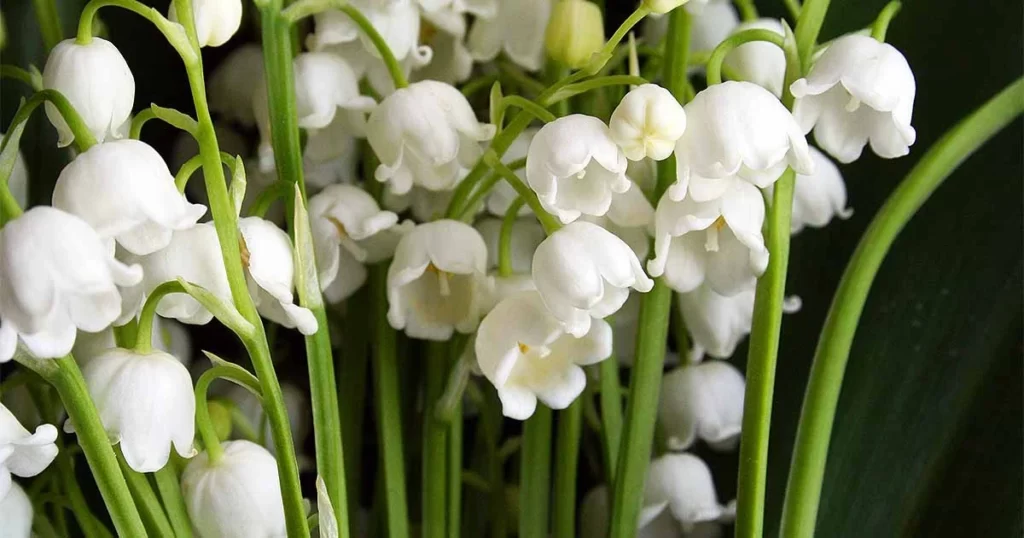
5. Cactus (Cactaceae)
Experts in Vastu and Feng Shui contend that cacti, despite their beauty, can transmit negative energy inside the home.
The leaves are prickly, have pointed thorns, and are thought to contain unfavorable energies. According to Vastu, having a cactus in the house can bring bad luck, stress and anxiety to the entire family.
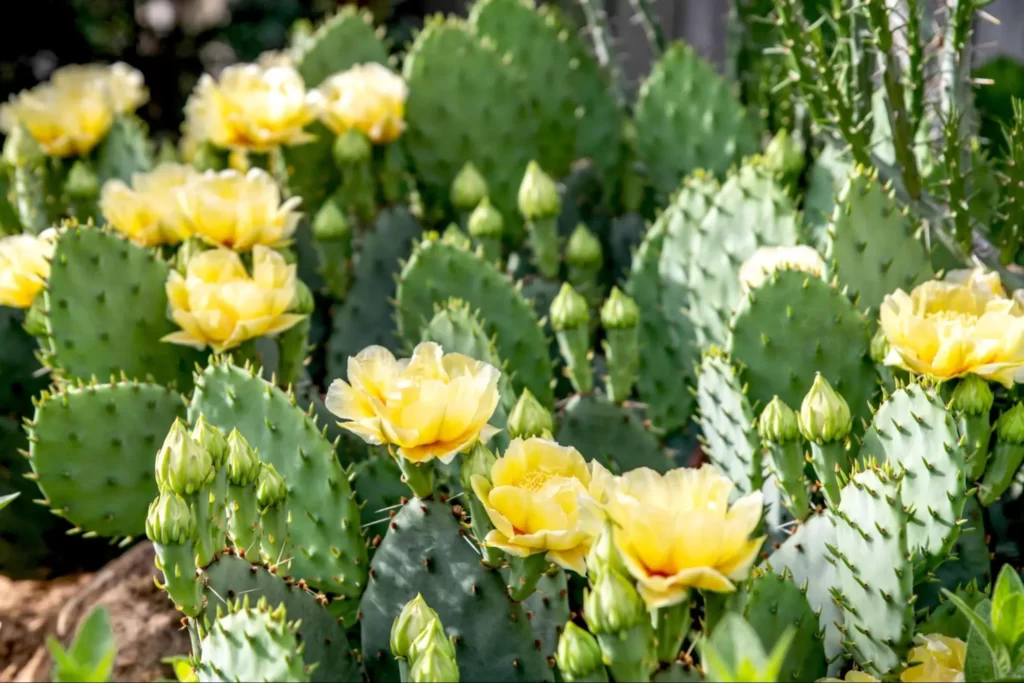
Benefits of placing the plants for business success in the office
According to studies, adding a little greenery in the form of indoor plants can significantly positively impact both employees and their organizations.
The same holds for remote or home employees.
Here are the top reasons you should invest in some plants for your desk or broader workplace.
- Improved Air Quality: Plants are natural air purifiers. They absorb carbon dioxide and release oxygen while filtering out pollutants and toxins, leading to cleaner and healthier air for you and your colleagues.
- Enhanced Productivity: Studies have shown that the presence of plants in the workplace can increase productivity. The improved air quality and aesthetics contribute to a more comfortable and motivating environment, boosting focus and efficiency.
- Reduced Stress: Plants can have a calming effect on people. Their presence can help reduce stress and anxiety, making the work environment more relaxed and conducive to creativity.
- Increased Creativity: Greenery can stimulate creativity and problem-solving abilities. The natural elements in a workspace can inspire fresh ideas and innovative thinking.
- Noise Reduction: Some larger plants and those with broad leaves can help absorb and diffuse sound, reducing noise levels in the office. A quieter and more concentrated workspace may result from this.
- Enhanced Aesthetics: Plants add a touch of nature and beauty to your workspace, making it more visually appealing. This can improve the overall ambiance and make the environment more inviting.
- Boosted Morale: Caring for plants can boost employee morale. When plants thrive under your care, you feel a sense of responsibility and accomplishment, contributing to a positive workplace culture.
- Health Benefits: Plants have been shown to reduce minor health complaints like headaches and dry skin by increasing humidity levels in the office. This can lead to fewer sick days and increased overall well-being.
- Improved Concentration: Having plants in the office can enhance concentration and focus. The natural elements help reduce mental fatigue, making staying on task and productive easier.
- Positive Image: A well-maintained office with plants can convey a positive image to clients and visitors. It suggests that your organization cares about the environment, employee well-being, and attention to detail.
- Symbolism and Cultural Significance: Depending on the types of plants you choose, they can carry cultural or symbolic meanings. For example, Lucky Bamboo is believed to bring good luck, adding a layer of significance to your workspace.
- Flexibility: Many plants are low-maintenance and adaptable to different lighting conditions, making them practical choices for various office settings, including those with limited natural light.
Conclusion
Incorporating these plants into your business environment can enhance the aesthetic appeal, foster positive energy, reduce stress, and potentially attract good fortune and financial success.
While these beliefs may vary from culture to culture and individual to individual, the presence of these plants can undoubtedly contribute to a more pleasant and productive workspace.
Caring for plants can also promote employee teamwork and responsibility, ultimately creating a healthier and more prosperous business environment.






